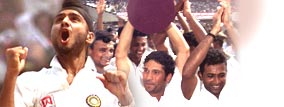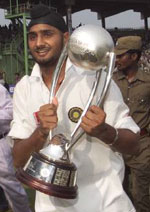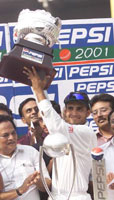



Prem Panicker
Hold off on the celebrations for just a second -- and with everything you've got, applaud a man with a brittle body and a heart bigger than the stadium he performed prodigies in today.
Jason Gillespie was incredible -- and you use that word only because you can't find a stronger one. India needing 155 to win, 70 overs to get it in, and a batting lineup that had, in its two previous innings, batted over five sessions and scored at speed.
Glen McGrath, the more visible face of Australian fast bowling, was good in his first spell, but never threatening. Colin Miller at first change seemed to be bowling his off spin on a different pitch from the one on which Harbhajan, yet again, performed brilliantly. Shane Warne -- the spearhead, the man expected to flatten India with the backing of two quality seamers -- was smashed out of the attack. And despite two wickets against the run of play, India was running away with the game.
Or would have, except for one man who just did not know how to give up.
Long after everything else about this series is forgotten, one image will remain evergreen -- a tall, lanky young man, walking back as slowly as possible to the top of his bowling mark, trying to use every extra second to give his body some rest, talking to himself every step of the way. Turning. Facing the batsman. Pausing -- and visibly gathering himself for yet another supreme effort, then bursting out of the blocks to send down yet another sizzling delivery.
Jason Gillespie single-handedly lifted his team. The other ten seemed to realise, suddenly, that there was something special happening in their midst, got a second wind, and lifted their own game.
An Australian reader, in mail day before yesterday, said: "This Test is looking for a hero." Today, it found one -- and as so often happens, that hero happened to be part of the team that lost.
Another mail -- which reached me one minute after the winning runs were hit, read: "Today is special. My 18 month old son managed to say 'cricket', and we won. Even it went to the wire, we won and that is what matters."
Right. It matters -- and quite a lot at that -- that India became the 7th team in history to come back from a one Test deficit to win a three-Test series. It matters to a country rocked by the match-fixing scandal, a nation losing faith in a team that seemed to delight in underperforming. It mattered to a captain and a team that appeared to have lost its self-belief, its self-confidence and self-respect.
 And when that 18-month-old kid grows up, and learns the meaning of the word he learnt to pronounce today, I suspect it will matter to him, too.
And when that 18-month-old kid grows up, and learns the meaning of the word he learnt to pronounce today, I suspect it will matter to him, too.
Play resumed this morning with Steve Waugh and Jason Gillespie at bat, and Harbhajan Singh and Nilesh Kulkarni with the ball. Nilesh apparently has been asked to bowl the defensive line outside leg stump -- a management decision, for why we will never know. At the other end, Harbhajan attacked from ball one. The Australian batsmen, meanwhile, remained intent on staying out there as long as they could -- they not only needed runs, but also needed to play out overs to push the asking rate for India as high as they could.
Steve Waugh -- whose second innings failures are as remarkable, really, as his first innings brilliancies -- was the first to go. Harbhajan had been focussing on making Waugh play forward to him, and got him on the typical spinner's dismissal -- a series of deliveries on length, then the one dropping that tad shorter, getting the batsman lunging forward but not to the pitch, for the ball to bounce, get the edge, and balloon for SS Das to take a simple catch at short square leg.
Gillespie defended dourly, his tenure extended by another missed stumping by Samir Dighe off Nilesh Kulkarni. Again, it was Harbhajan who got the wicket, and again, the manner of it showed that the youngster has learnt to think opponents out. With Gillespie pushing firmly down at any ball that landed anywhere close to the stumps, the offie went around the wicket and thumped one down on a short length, the ball rearing up at the tailender and giving him no option but to fend it off to Dravid at leg slip.
Glen McGrath flung his bat around to some purpose, aided by a dropped catch by Sourav Ganguly at silly point, and added 11 to the Australian total, but Harbhajan by then was unstoppable. Noticing that Miller was content to push forward with bat tucked behind his pad, the offie fired one down at top speed, on a very full length, beating the defence and going through to take the back pad bang in front of middle -- and Australlia were all out for 264 in just under 98 overs, giving them a lead of 154 and India a target of 155 with 70 overs to get it in.
Now check out this set of figures: 41.5-20-84-8, those eight wickets adding on to the 7 he took in the first innings. Barring Narendra Hirwani, who had a minefield of a pitch to work on, no other Indian bowler has returned these kind of match statistics. And no bowler other than Richard Hadlee (33) has snared as many wickets in a three Test series as Harbhajan (32).
It is a performance perhaps unparalleled -- 32 wickets out of the 50 that fell during this series, with the next highest wicket-taker being Sachin Tendulkar and Zahir Khan with three apiece. And -- though this is often forgotten in the euphoria surrounding Laxman's heroics in Calcutta, it was the Harbhajan hat-trick that for the first time gave the Aussies pause in what, till then, seemed an unstoppable juggernaut.
For India, the ask seemed easy. They only needed to play sensible cricket, concentrate on staying in the middle knowing that the bad balls would come along anyway. And that is what the Indian openers seemed intent on -- both Das and Ramesh began well, neither of them tempted to flash, yet neither willing to let a bad ball go unpunished. The first wicket, in fact, seemed against run of play when McGrath banged in a quick bouncer on line of off. On that line, it is difficult for a batsman to move inside the line enough to get it coming over his left shoulder -- which is where it needs to be for the hook. Das was cramped for a thoroughly unnecessary shot, went through with it anyway, and put it up in the air for the bowler to hold on the follow through.
That brought Ramesh and Laxman together. Ramesh began aggressively, driving and cutting with fluency -- but within minutes of his arrival, it was Laxman, seemingly in unstoppable form, who took centrestage. A couple of flowing back foot drives off the quicks set the stage and once Miller came on, Laxman was in his elements. Drives on either side of the track, and perfectly placed cuts, flowed from his bat, and India seemed intent on wrapping the game up in the heck of a hurry.
Again, out of the blue and against the run of play, came the wicket. Ramesh unaccountably lost some of his initial ease, began flashing outside off, and seemed under a bit of pressure. He sought to relieve it by hitting a ball out on the off side and running the single -- only, he hit straight to the fielder, put his head down, and just kept running. There is, in running between the wickets, a third call other than 'Yes' and 'No' -- but the opener ran as if he had never heard the word 'Waiting' in his life, and with his head down, there was no way he could see Laxman's raised hand either.
Sachin Tendulkar walked in next. And seemed content to let Laxman do all the hard work, while he defended his end and waited for the loose delivery to pounce on. Warne was on at the time, Laxman took two fours off his first over, another seven runs off his next, three smashing fours in the next, Tendulkar chipped in with a fierce pull of his own -- and as the 100 came on the board with both batsmen going a run a ball, an anti-climactic end to a hard fought series seemed on the cards.
Enter, Jason Gillespie. Going round the wicket, he produced a blinder. A ball that hit good length, kicked, seamed in at lightning speed and touched Sachin's bat as he swayed right back and tried to pull out of line, and gave Mark Waugh at slip his 150th catch. Gillespie had bowled superbly without luck throughout this series -- this time, luck was with him as he went too far wide of the crease and cut the line, without the umpire spotting it and calling the no-ball. Irrespective -- if you can, check that ball out in the highlights package, there is no batsman in the world who could have handled that one.
Till that point, Australia had contented itself with just a couple of slips. Saurav Ganguly's entry signalled a change in plan -- three slips, two gullies, another man under the helmet, and the Aussies were on the hunt. India was just 52 shy of the target, Laxman looked like he could bat all day if he wanted to, Ganguly had a tailormade situation to just bat out the overs, getting himself some practise into the bargain -- but ended up slashing one ball through the slip cordon for four, then guiding the next to the ubiquitous Mark Waugh.
In came Dravid -- and out he went. It is strange, really -- India has, in the past, lost chasing small targets, simply because its premier batsmen insisted on playing too many shots too early. Dravid, confronted by Colin Miller, jumped down to on drive, hit too fiercely, shutting the bat face early in his hurry, got the leading edge, and Steve Waugh at mid off dived to take a good catch. And suddenly, India at 122/5 looked up and realised that there was only the calm, composed Laxman left standing while the array of superbats had made a meal of it again. What made the situation really unsupportable was the fact that at that point, India needed less than one run per over.
In Bombay, Ricky Ponting at mid on had taken the catch that turned the match. Here, it was Mark Waugh's turn. Laxman, right through, was batting as though he was playing on a ground different from the one on which his mates were parading in and out of the dressing room, timing his shots against pace and spin alike with a fluency and ease that ensured, among other things, that he will get to walk in at number three for the foreseeable future.
Once Dravid went, he settled down to farm the singles, with composure still unruffled. Miller, trying a bit too hard yet again, pitched one in his own half of the track -- a put-away ball if ever there was one. Laxman rocked back, and pulled with ferocious power. And Mark Waugh, at mid on, dived headlong and plucked a daisy -- or so it seemed, as he completed a catch to a ball going away from him at bullet speed.
The game had swung, and completely at that. Australia immediately teamed McGrath with Gillespie. The latter by then had already bowled a long spell -- but kept coming in and slinging them down off his picture perfect action, giving the batsmen no respite.
Samir Dighe, with a horror of a game behind the stumps, showed grit with the bat, batting calmly on, taking every chance he could to add runs to the board, and pushing his partners to run singles hard.
Sairaj Bahutule did not last long. Not a good player of off spin at his best, the left-hander pushed blindly at a ball from Miller floated up around off, turning away, and Shane Warne at slip did very well to hold as the ball dipped in on him.
Zahir Khan then came in -- and displayed enormous grit to face down Gillespie, getting his bat and body solidly behind the line. Not pretty, but for 14 valuable balls while Dighe added 16 invaluable runs, effective. McGrath got one to reverse swing, landing it on yorker length an inch outside off. Zahir either had to play, or find his stumps shattered. He played -- and Mark Waugh snaffled his fourth catch at slip.
 As it turned out, it was his last. With an entire stadium egging them on, Dighe chipped a couple, then Harbhajan -- seemingly deaf to his partner telling him to just hang on -- got a delivery identical to the one that took out Zahir, and cool as you please, clipped it through point for the winning brace.
As it turned out, it was his last. With an entire stadium egging them on, Dighe chipped a couple, then Harbhajan -- seemingly deaf to his partner telling him to just hang on -- got a delivery identical to the one that took out Zahir, and cool as you please, clipped it through point for the winning brace.
India had won -- only just -- by two wickets, with just under 29 overs to spare. And wrapped up the series 2-1. And on balance, the dramatics of the post lunch session had provided a fitting finale to an incredibly hard-fought series. As Steve Waugh said in the post-match presentation, "The guys gave it everything they had -- in all fairness, I couldn't have asked more of them than that."
It will take a while for all of it to sink in. Longer still, for the balance sheets to be drawn up, the pluses and minuses to be calculated.
For now, there is just the sound of champagne corks popping. And of proud papas teaching little toddlers, around the country, to lisp the word 'cricket'.
Scoreboard
Images from the Final Day's play.
Commentary Transcripts:
Morning session | Post Lunch | Post Tea
Mail your comments